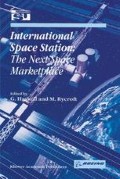Abstract
The International Space Station represents a remarkable milestone: if managed correctly, it has the potential of becoming the first truly global marketplace, one set above all national borders. Yet, contrary to its name, the ISS is currently far from being international. Under current agreements, it is, in fact, only accessible through the national space agencies of a select group of participating nations.
In this paper, an innovative concept is suggested where the use of the ISS is managed in a fair and efficient manner, allowing not only the ISS participating nations but all users, including developing nations and commercial companies, to benefit from use of this international orbiting station. The proposal is based upon the creation of a ‘quasi-IGO’, whose main business would be to run and manage efficiently the allocation of Space Station resources to potential users. The company would be set up by a consortium of international businesses and would act as a single point contact between the end user customers and the national space agencies of the ISS participating nations. The Company would also offer other services.
A concept of a ‘participation fee’ is introduced in the paper, whereby a fee is collected from all parties wishing to send payloads to the ISS, except from the initial consortium of founding companies. The collected funds are used to subsidise experiments from educational users and those from the developing countries, thereby making the Space Station more accessible to all. In addition to the fees, users are also subject to a charge for each payload or experiment they wish to send, which would vary according to the launch and operation costs, and the amount of resources required aboard the station. As a conclusion, the current trend of commercial businesses being encouraged to access space without having recourse to public funds is mentioned, and the potentially attractive implications which this has on the proposed venture is explained.
George Inoue currently works as a finance officer at Inmarsat Ltd. The views presented in this paper are those of the author and do not reflect those of the organisation.
Access this chapter
Tax calculation will be finalised at checkout
Purchases are for personal use only
Preview
Unable to display preview. Download preview PDF.
References
ESA Space Station Utlisation Division: The International Space Station - European Users Guide. Directorate of Manned Spaceflight and Microgravity, ESTEC, Noordwijk, The Netherlands, 1998
Bartoe, J. D. F.: International Space Station - Programs and Research Prospectus, Presented at the Second European Symposium for the Utilisation of the ISS, Paris, ESTEC, Noordwijk, The Netherlands, November 16, 1998
Inmarsat Ltd.: Inmarsat Internet Site, <http://www.inmarsat.org>. Inmarsat, London, UK, April 4, 1999
Eutelsat: Eutelsat Internet Site, <http://www.eutelsat.com>. Eutelsat, Paris, France. April 10, 1999
Intelsat: International Telecommunications Satellite Organisation (Intelsat) Internet Site, <http://www.intelsat.int>. Intelsat, Washington D.C., United States, April 8, 1999
ESTEC Public Relations Office: ESA. November 1995
Personal notes of ISU Lectures by industry officials, January-February 1998
NASA Act of 1999 (Introduced in House), HR. 1654 SEC.203 Commercial Space Goods and Services, <http://thomas.loc.gov>. May 2, 1999
Commercial Space Competitiveness Act of 1999 (Introduced in House), HR. 1526, <http://thomas.loc.gov>. May 2, 1999
Commercial Space Act of 1998 (Agreed by the House), H.RES.572, <http://thomas.loc.gov>. May 2, 1999
Iridium: Iridium LLC. Internet Site, <http://www.iridium.com>. Iridium, Reston, VA, United States, April 20, 1999
Author information
Authors and Affiliations
Editor information
Editors and Affiliations
Rights and permissions
Copyright information
© 2000 Springer Science+Business Media Dordrecht
About this chapter
Cite this chapter
Inoue, G., Maroothynaden, J. (2000). Commercial Management for the Space Station: Making the ISS More Accessible to All. In: Haskell, G., Rycroft, M. (eds) International Space Station. Space Studies, vol 4. Springer, Dordrecht. https://doi.org/10.1007/978-94-011-4259-5_20
Download citation
DOI: https://doi.org/10.1007/978-94-011-4259-5_20
Publisher Name: Springer, Dordrecht
Print ISBN: 978-94-010-5846-9
Online ISBN: 978-94-011-4259-5
eBook Packages: Springer Book Archive

